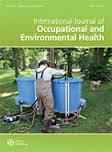 Past and present members of the editorial board of a public health journal have filed a formal complaint against the publisher after it appointed an editor with industry ties without consulting the board, and unilaterally retracted a paper by the former editor.
Past and present members of the editorial board of a public health journal have filed a formal complaint against the publisher after it appointed an editor with industry ties without consulting the board, and unilaterally retracted a paper by the former editor.
Meanwhile, the board and publisher of the International Journal of Occupational and Environmental Health continue to exchange letters about the issue; the latest from the publisher, Taylor & Francis, answers some of the board’s ongoing questions — and declines to answer others.
For instance, managing director Ian Bannerman previously told the board that the publisher “reached out to” editorial board member Jukka Takala of the Workplace Safety and Health Institute in Singapore (by phone and email) before contacting new editor Andrew Maier. Takala told us last month, however, he was “never consulted on Dr. Maier.” In a letter dated May 25, Bannerman told the board:
…we spoke to a number of contacts in the field to seek advice on the appointment of a new Editor-in-Chief and opportunities for the journal in general. One of those was Dr. Jukka Takala, whom we first emailed on 11th March 2016 and whom my colleagues Andrew Kelly and Matthew Cannon subsequently spoke to by telephone on 14th March 2016. They spoke about the recent history of the journal and Dr Takala’s views on opportunities for the future. They did not speak specifically about Dr Maier, as his name had not been suggested to us in the future (and for the avoidance of doubt, my previous letter did not say that Dr Maier was discussed).
Bannerman also denied that Maier was selected for any pro-industry agenda:
It was not, nor would ever be, a criterion to find some who represented a particular corporate perspective, whether pro- or anti-…I wish to reiterate that this was not a factor in our selection process.
As we reported in May, the journal is re-reviewing three papers after they were slated for publication by previous editor David Egilman; on that matter, Bannerman declined to provide further details:
As I hope you will appreciate, we need to be mindful of the relevant authors on this issue, especially given that our previous correspondence has been distributed to the media. We are therefore not able to set out any further details here or to identify the authors of the three articles that have been flagged up as raising potential concerns.
In response, in a letter dated June 2, former and current members of the IJOEH editorial board filed a formal complaint to the Committee on Publication Ethics (COPE), alleging that the publisher is violating COPE guidelines by retracting Egilman’s paper and holding up three others:
COPE Guidelines state clearly that a new editor “should not overturn decisions to publish submissions made by the previous editor unless serious problems are identified.” No such evidence has been provided. It appears that the Publisher, with or without the involvement of the new Editor-in-Chief, is acting in disregard of this guideline.
Like Retraction Watch? Consider making a tax-deductible contribution to support our growth. You can also follow us on Twitter, like us on Facebook, add us to your RSS reader, sign up on our homepage for an email every time there’s a new post, or subscribe to our daily digest. Click here to review our Comments Policy. For a sneak peek at what we’re working on, click here.
Battle …. wages on
I don’t think I’ve ever seen “wage” used as a reflexive verb like that. Are you sure?
“This battle won’t wage itself!”
No, but we’re in good company! 🙂
https://www.google.com/search?q=battle+wages+on&rlz=1C1DLLA_enUS616US616&oq=battle+wages+on&aqs=chrome..69i57j0l2j69i61l2.1992j0j7&sourceid=chrome&ie=UTF-8
Long time reader, first time commenter. It is unfortunate that Dr. Maier is being portrayed as pro-industry and that his history as a consultant is the reason he would have retracted an article. Dr. Maier took an academic position and is currently at the University of Cincinnati, the accusations don’t really talk about that. Dr. Maier’s work as a consultant had a focus on generating more scientifically justified and informed risk assessments. I don’t understand why educating industry on the proper way to assess hazards and risks is a negative thing. I would describe Dr. Maier as a scientist with solid credentials and a great publication history, his previous experience makes him more well rounded – not a villain. I cannot comment on the procedural call on retracting the work, I have no experience with that and will leave that to others to comment. The issue is about procedure and whether it was followed. Speculating on Dr. Maier’s motives and whether he is tainted by his industry experience distracts from the real issue. I will disclose that I work for “industry”, but I am not that far removed from academia. I once met Dr. Maier at a course he was giving on risk assessment techniques, it was a great course and I am sorry to see him now painted as an industry shill.